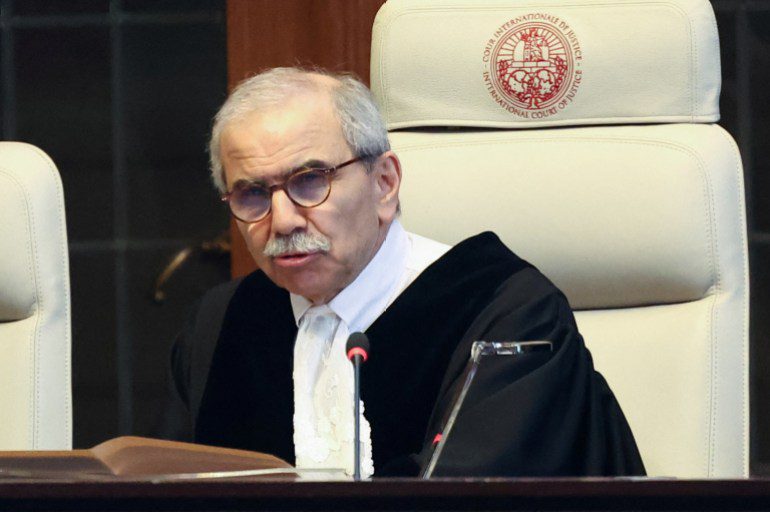The International Court of Justice has ruled that Israel’s continued presence in the occupied Palestinian territories is illegal and must end “as soon as possible.”
The President of the International Court of Justice in The Hague, Nawaf Salam, read out the non-binding advisory opinion issued by its 15-judge panel on Israel’s occupation of Palestinian territories, on Friday.
The judges pointed to a wide range of policies – including the construction and expansion of Israeli settlements in the West Bank and East Jerusalem, the use of natural resources in the area, the annexation and permanent control of territory and discriminatory policies against Palestinians – all of which they said violate international law.
The court said that Israel has no right to sovereignty over the territory, violates international laws against the acquisition of territory by force, and impedes the Palestinians’ right to self-determination.
The more than 80-page summary read by Salam said other countries were obligated not to “provide aid or assistance in maintaining” the Israeli presence in the area. It said Israel must end settlement construction immediately and existing settlements must be removed.
The court said that “Israel’s abuse of its status as an occupying power” makes “its presence in the occupied Palestinian territories illegal.”
The court said that “the Israeli settlements in the West Bank and East Jerusalem, and the regime associated with them, were established and are maintained in violation of international law.”
The request for the Court’s opinion came within the framework of a request made by the United Nations General Assembly in 2022.
The International Court of Justice, also known as the World Court, is the highest body of the United Nations for settling disputes between states.

Israel occupied the West Bank, Gaza Strip and East Jerusalem — areas of historic Palestine that Palestinians want for a state — in the 1967 war. Since then, it has built and steadily expanded settlements in the West Bank and East Jerusalem. It also established settlements in Gaza before withdrawing in 2005.
The United Nations and the vast majority of the international community consider the Palestinian territories to be occupied by Israel.
‘decisive moment’
Palestinian Foreign Minister Riyad al-Maliki told reporters in The Hague that the ruling represents “a watershed moment for Palestine, justice and international law.”
“The ICJ has fulfilled its legal and moral duties with this historic ruling,” he added. “All states must now live up to their clear obligations: no aid, no assistance, no complicity, no money, no weapons, no trade, nothing – no actions of any kind in support of Israel’s illegal occupation.”
Palestinian Ambassador to the United Nations Riyad Mansour said the ruling was an “important step” towards ending the occupation and realizing the inalienable rights of the Palestinian people, including the right to self-determination, statehood and the right of return.
The right of return is a demand that Palestinians who were forced to leave their homes in the 1948 Nakba and the 1967 Arab-Israeli War be allowed to return to them.
Mansour said his team would study the entire opinion and “dissect every sentence.”
“We will consult with an army of friends in the United Nations and around the world,” he said, adding that “we will present a masterpiece of a resolution” at the UN General Assembly.
The Israeli Foreign Ministry rejected this view, describing it as “fundamentally wrong” and biased.
Israeli Prime Minister Benjamin Netanyahu’s office issued a statement calling the ruling a “decision of lies” that distorts the truth, and stressing that “the Jewish people are not occupiers in their own land.”
Human rights lawyer Jeffrey Nice told Al Jazeera it would be difficult for world leaders to “completely ignore” the ICJ ruling even though it is non-binding.
“This is part of the legal system that says enough is enough,” he said.
He said it would also be “difficult for an interested, informed and concerned public not to say: It is time for Israel to put its house in order.”
“There is a lot of hope that this ruling will support an international movement in the West and elsewhere in the world in favour of more sanctions and more pressure on Western governments to put more pressure on Israel,” said Marwan Bishara, a senior political analyst at Al Jazeera.
In a separate case brought by South Africa, the International Court of Justice is considering allegations that Israel is committing genocide in its war on Gaza.
A preliminary ruling has already been issued in this case, with the court ordering Israel to prevent and punish incitement to genocide and to increase the provision of humanitarian assistance.
In May, the International Court of Justice ordered Israel to halt its assault on the southern Gaza city of Rafah, citing an “immense danger” to hundreds of thousands of Palestinians sheltering there. But Israel has continued its attacks on Gaza, including Rafah, in defiance of the UN court.

“Infuriatingly humble alcohol fanatic. Unapologetic beer practitioner. Analyst.”
